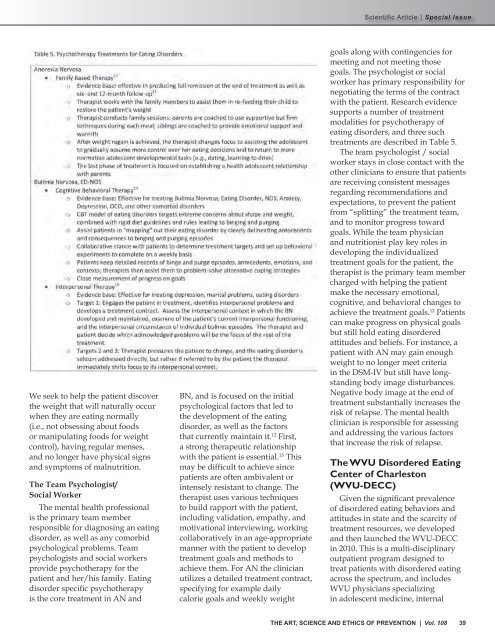Special CME Issue - West Virginia State Medical Association
Special CME Issue - West Virginia State Medical Association
Special CME Issue - West Virginia State Medical Association
You also want an ePaper? Increase the reach of your titles
YUMPU automatically turns print PDFs into web optimized ePapers that Google loves.
We seek to help the patient discover<br />
the weight that will naturally occur<br />
when they are eating normally<br />
(i.e., not obsessing about foods<br />
or manipulating foods for weight<br />
control), having regular menses,<br />
and no longer have physical signs<br />
and symptoms of malnutrition.<br />
The Team Psychologist/<br />
Social Worker<br />
The mental health professional<br />
is the primary team member<br />
responsible for diagnosing an eating<br />
disorder, as well as any comorbid<br />
psychological problems. Team<br />
psychologists and social workers<br />
provide psychotherapy for the<br />
patient and her/his family. Eating<br />
disorder specific psychotherapy<br />
is the core treatment in AN and<br />
BN, and is focused on the initial<br />
psychological factors that led to<br />
the development of the eating<br />
disorder, as well as the factors<br />
that currently maintain it. 12 First,<br />
a strong therapeutic relationship<br />
with the patient is essential. 13 This<br />
may be difficult to achieve since<br />
patients are often ambivalent or<br />
intensely resistant to change. The<br />
therapist uses various techniques<br />
to build rapport with the patient,<br />
including validation, empathy, and<br />
motivational interviewing, working<br />
collaboratively in an age-appropriate<br />
manner with the patient to develop<br />
treatment goals and methods to<br />
achieve them. For AN the clinician<br />
utilizes a detailed treatment contract,<br />
specifying for example daily<br />
calorie goals and weekly weight<br />
goals along with contingencies for<br />
meeting and not meeting those<br />
goals. The psychologist or social<br />
worker has primary responsibility for<br />
negotiating the terms of the contract<br />
with the patient. Research evidence<br />
supports a number of treatment<br />
modalities for psychotherapy of<br />
eating disorders, and three such<br />
treatments are described in Table 5.<br />
The team psychologist / social<br />
worker stays in close contact with the<br />
other clinicians to ensure that patients<br />
are receiving consistent messages<br />
regarding recommendations and<br />
expectations, to prevent the patient<br />
from “splitting” the treatment team,<br />
and to monitor progress toward<br />
goals. While the team physician<br />
and nutritionist play key roles in<br />
developing the individualized<br />
treatment goals for the patient, the<br />
therapist is the primary team member<br />
charged with helping the patient<br />
make the necessary emotional,<br />
cognitive, and behavioral changes to<br />
achieve the treatment goals. 12 Patients<br />
can make progress on physical goals<br />
but still hold eating disordered<br />
attitudes and beliefs. For instance, a<br />
patient with AN may gain enough<br />
weight to no longer meet criteria<br />
in the DSM-IV but still have longstanding<br />
body image disturbances.<br />
Negative body image at the end of<br />
treatment substantially increases the<br />
risk of relapse. The mental health<br />
clinician is responsible for assessing<br />
and addressing the various factors<br />
that increase the risk of relapse.<br />
The WVU Disordered Eating<br />
Center of Charleston<br />
(WVU‐DECC)<br />
Given the significant prevalence<br />
of disordered eating behaviors and<br />
attitudes in state and the scarcity of<br />
treatment resources, we developed<br />
and then launched the WVU-DECC<br />
in 2010. This is a multi-disciplinary<br />
outpatient program designed to<br />
treat patients with disordered eating<br />
across the spectrum, and includes<br />
WVU physicians specializing<br />
in adolescent medicine, internal<br />
THE ART, SCIENCE AND ETHICS OF PREVENTION | Vol. 108 39















